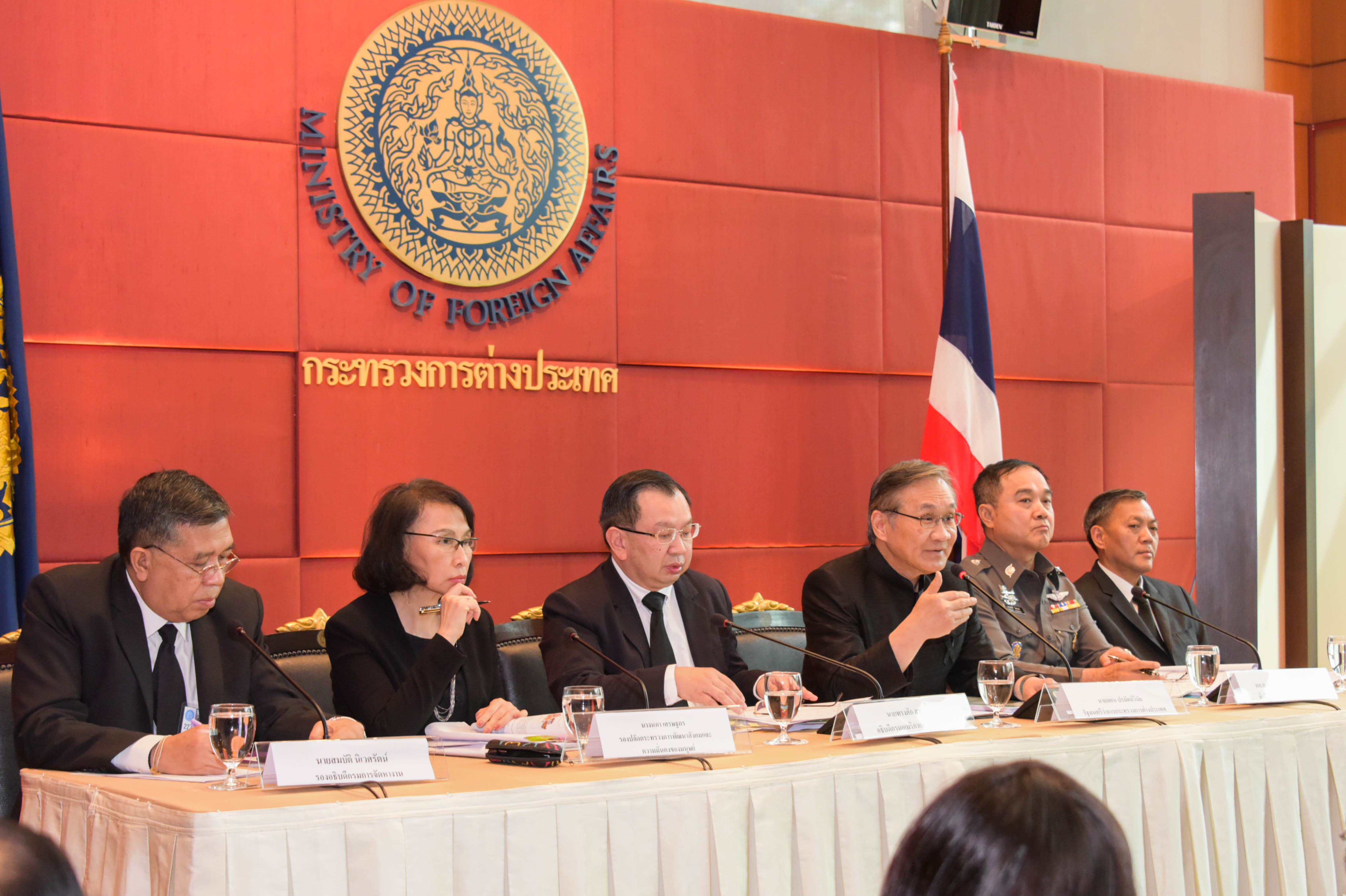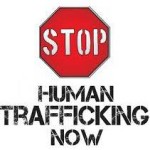
On 2 February 2017 H.E. Mr. Don Pramudwinai, Minister of Foreign Affairs of Thailand, as Chairman of National Sub-Committee on Public Relations and Legal Affairs under the Policy Committee on Human Trafficking and Illegal Fishing, met the members of the Thai and foreign media correspondents in Thailand at the Ministry of Foreign Affairs of Thailand, and give a briefing on Thailand’s Trafficking in Persons 2016 Country Report, which documents the Royal Thai Government’s ongoing commitment to its “zero tolerance” policy against human trafficking. The Foreign Minister was joined by Mrs. Napa Setthakorn, Deputy Permanent Secretary, Ministry of Social Development and Human Security; Pol. Gen. Tamasak Wicharaya, Advisor (Level 10)/Deputy Director of Center for Children, Women, Family Protection and Anti-Trafficking in Persons; and Pol. Lt. Gen. Kriboon Suadsong, Commissioner, Office of Police Strategy; Mr. Songsak Saicheua, Director-General, Department of American and Pacific Affairs, Ministry of Foreign Affairs; as well as Mr. Sombat Nivesrat, Deputy Director-General, Department of Employment, Ministry of Labour.
The Report features Thailand’s efforts and key development in combatting human trafficking along the five strategic dimensions or 5 Ps namely: Policy, Prosecution, Protection, Prevention and Partnership. The summary of key achievements is as follows:-
1. Policy
Combatting trafficking in persons remains a national agenda. In 2016, the Royal Thai Government has translated its commitment to “zero tolerance” policy against human trafficking into action through several measures and implementations. The Government substantially increased the overall anti-human trafficking budget, up to 23.88 percent compared to FY2015, to provide sufficient resources to support actions in all key areas. The Government also intensified legal reforms, improving existing legislations and drafting new ones. The Government developed a 24-point Action Plan encompassing the elements of all 5Ps. An Ad Hoc Sub-Committee on Increasing Effectiveness of Human Trafficking Prosecution was set up to coordinate law enforcement authorities to enhance effectiveness in prosecution.
2. Prosecution
Improved quality and speed of legal proceeding was due to better coordination between the police, prosecutors, the court of justice, and other law-enforcement agencies. The work of special units in anti-trafficking, established for example in the Office of the Attorney-General and the Court of Justice, and the utilization of Inter-agency Database System helped enhance prosecution efficacy. The Government also tackled head-on the economic incentives of traffickers by utilizing other regulations, including anti-money laundering and administrative powers, to complement anti-human trafficking efforts. Throughout the year 2016, the Government’s anti-human trafficking measures focused on changing the human trafficking trade from a low-risk, high return attraction into a high-risk, no return proposition with a high cost of punishment. Significant achievements and progress made in 2016 were the increased number of human trafficking cases uncovered, investigated, indicted and convicted.
In 2016 the Royal Thai Police uncovered and investigated 333 cases and the Office of the Attorney-General indicted 301 cases, or an increase of 5 percent and 19.92 percent respectively compared to those in 2015. The number of convicted offenders in 2016 was 268, which rose 30.7 percent in comparison to 205 in 2015. Assets seized from traffickers increased by 307 percent to 22 million USD compared to 2015. Criminal and disciplinary actions were also taken against 45 government officials since 2013, including 10 police officers in 2016.
3. Protection
The Government adopted a victim-centered approach and focusing on protecting vulnerable groups. The government strengthens protection services and improve rehabilitation, care and welfare provision for TIP victims by equipping victims with skills necessary for embarking on new life path and reintegration into their respective communities, as well as developing rehabilitation plan aimed at empowering victims and protecting re-victimization.
Key highlights in 2016 included greater employment opportunities for victims, with 196 victims offered jobs inside and outside shelters or an increase of 350.1 percent from only 47 victims in 2015. Migrant trafficking victims and witnesses were allowed to stay in Thailand for up to 2 years. The efficiency of victim identification was enhanced through a consistent use of the new Guideline by all relevant agencies.
4. Prevention
Thailand in 2016 strengthened its labor and migrant workers management system to help eliminate legal loopholes in laws and regulations, and reduce vulnerabilities for migrant workers, women and children. This included the introduction and enforcement of new law regulating migrant labor recruitment agencies while reducing the costs and time for migrant workers to enter Thailand, and the requirement of compulsory secondary identification documents in fishery sector, such as the Seaman Book (for Thais) and Sea Book (for migrant workers). In 2016, Thailand also ratified the ILO’s Occupational Safety and Health Convention No. 187, and the ILO’s Maritime Labor Convention (MLC).
5. Partnership
To address the transnational nature of human trafficking, the Government has deepened and broadened its partnerships with all stakeholders, including foreign governments – particularly neighboring countries – the private sector, international organizations, and civil society organizations – domestic and abroad, including with neighboring countries and regional cooperation. Key achievements included Thailand depositing the Instrument of Ratification of the ASEAN Convention against Trafficking in Persons, Especially Women and Children (ACTIP), enhancing its cooperation with partners under the Australia-Asia Program to Combat Trafficking in Persons (AAPTIP) and the Bali Process. In addition, the Government also deems the United States a significant partner in countering human trafficking and continued to work closely with various U.S. agencies, particularly in law enforcement, such as Homeland Security Investigation, Federal Bureau of Investigation. Thai government agencies have also been in close touch with a number of local and international news agencies in order to exchange views and ensure the accuracy of information and same understanding of trafficking in persons issues.
Thailand is committed to the prevention and suppression of human trafficking while taking a holistic approach to tackle the problem in a comprehensive, cooperative and sustainable manner.



